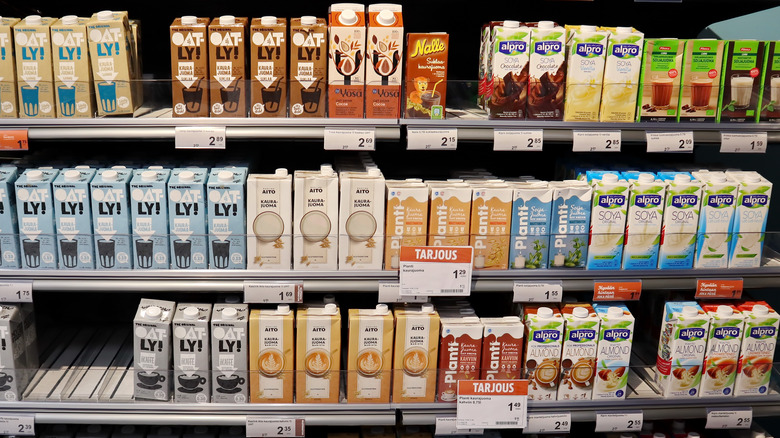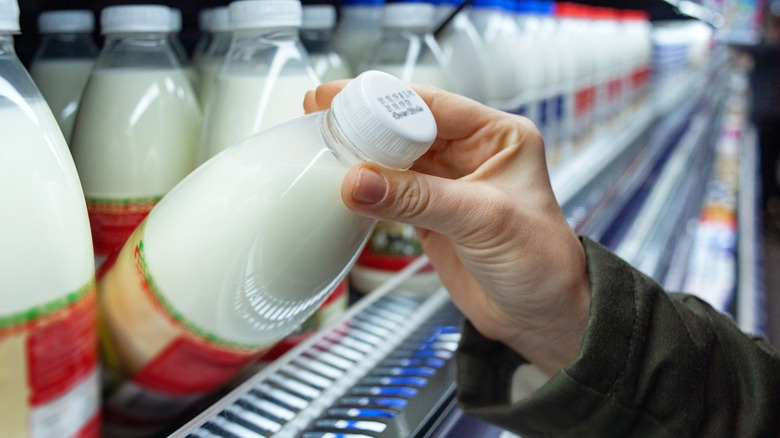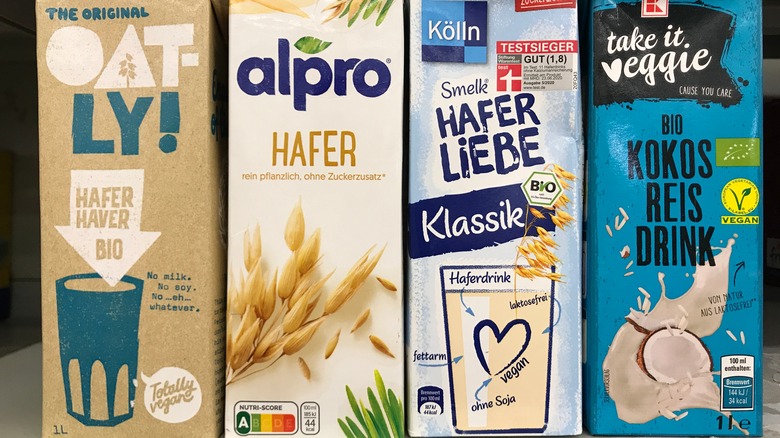Big Changes May Be Coming To Alternative Milk Labels
If you frequently pour a slip of oat milk into your coffee instead of cream or douse your favorite cereal in almond milk instead of cow's milk, you're not alone. According to Morning Consult, the plant-based milk market is growing and attracting new customers every day. The research data platform reports that while 2% dairy milk is the most common type of milk in Americans' homes, with 38% of 2,200 surveyed U.S. adults reporting that option as their favorite, non-dairy milk comes ranked a close third place among 12% of respondents. The site reports that a full 67% percent of respondents have tried plant-based milk, and about 1 in 3 drink it at least once weekly.
If you do your shopping at the grocery store, you've probably noticed this trend already, with non-dairy milks starting to crowd the refrigerator cases that once held only dairy milk and perhaps the stray carton of soy milk. But in spite of the growing popularity of milk alternatives, there has been a controversy brewing behind the scenes: Plenty of people (mainly those whose represent the dairy industry, but some others, too) don't think plant-based milks should be called "milk" at all since they don't actually come from a mammal (via The Network for Public Health Law). After several lawsuits relating to how non-dairy "milks" are labeled, big changes might actually be coming to cartons and jugs of oat, almond, and cashew beverages sometime this summer.
The dairy industry wants to retain the use of the word milk
If you enjoy plant-based beverages, you're probably well-accustomed to calling them "milk." But changes might be coming to how those non-dairy alternatives are labeled as soon as this summer. According to The Network for Public Health Law, those in the dairy industry, along with some consumers, have been pushing to remove the word "milk" from plant-based beverage containers for some time, arguing that the term is misleading under the Food and Drug Administration's (FDA) Food, Drug, and Cosmetic Act (FDCA). This act prevents mislabeled food from entering the marketplace. For example, bananas couldn't be labeled as tomatoes and sold that way. And accordingly, the FDA is also tasked with creating "Standards of Identity" for foods (per The Network for Public Health Law). According to the FDA via 21 CFR §131.110(a), milk is "the lacteal secretion, practically free from colostrum, obtained by the complete milking of one or more healthy cows."
The dairy industry and those within the FDA argued that plant-based dairy alternatives cannot meet this standard of identity, and that, therefore, their labeling as "milk" is misleading to consumers. Numerous lawsuits have been brought against the makers of plant milks for this very reason, according to The Network for Public Health Law, and in 2018, former FDA commissioner Scott Gottlieb famously stated, "[An] almond doesn't lactate" (via Food Navigator).
The FDA will soon release new guidelines on plant-based milk labeling
According to Food Navigator, the FDA has been working on new guidelines for the labeling of plant-based "milks," which it previously announced would be released by the end of this month. But most recently, the agency told Food Navigator that its draft guidance for the industry is currently under review by the Office of Management and Budget (OMB). This review period is typically around 90 days, reports Food Navigator, so the draft should come out by the end of the summer.
Previous lawsuits have all sided with the manufacturers of plant-based milks, such as in the case of 2013's Gitson v. Trader Joe's Co., in which soymilk purchaser Amy Gitson sued Trader Joe's, alleging that the store's plant-based beverage violated the Food, Drug, and Cosmetic Act (via The Network for Public Health Law). The court refuted Gitson's claim, stating that "[It] is implausible that the use of the word 'soymilk' misleads any consumer into believing the product comes from a cow."
In the European Union, Food Navigator writes, these standards have already been applied to the majority of plant-based beverages, which are typically labeled as "oat drink," "soy drink," etcetera. Within a few months, we should know whether these sweeping changes will arrive to U.S. refrigerator cases, too.


